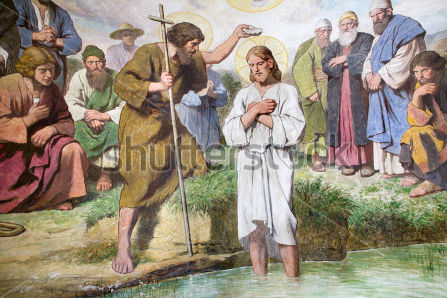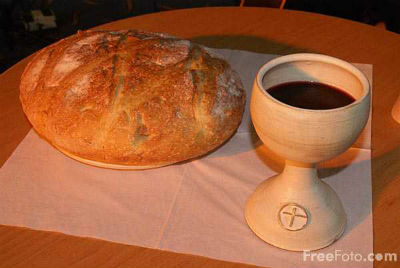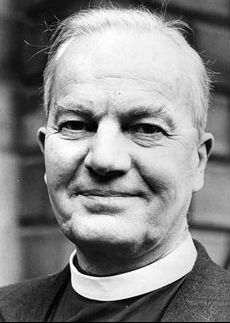 John Baptizer baptizes his cousin. The sinless Jesus went through the experience of baptism for us – to set the pattern for those who would come after as he did in all his life experiences. This is a part of the power of incarnational theology.
John Baptizer baptizes his cousin. The sinless Jesus went through the experience of baptism for us – to set the pattern for those who would come after as he did in all his life experiences. This is a part of the power of incarnational theology.By Neil Earle
 John Baptizer baptizes his cousin. The sinless Jesus went through the experience of baptism for us – to set the pattern for those who would come after as he did in all his life experiences. This is a part of the power of incarnational theology.
John Baptizer baptizes his cousin. The sinless Jesus went through the experience of baptism for us – to set the pattern for those who would come after as he did in all his life experiences. This is a part of the power of incarnational theology.As another year dawns the people in my age group are becoming more conscious of passing time. As Christians we want to be found faithful as Jesus taught in Matthew 25:23.
Which reminds me of my high school principals favorite saying, “Well begun is half done.”
It works. If you have a project to do – especially one you’d rather dodge – get jumping into it quickly and you begin to generate momentum to get the chore accomplished.
The obvious challenge for Christians is even harder. It is to live up to what Jesus counseled the church in first century Smyrna: “Be faithful, even to the point of death, and I will give you the crown of life.”
There is no lack of Biblical challenges to us on this subject of remaining faithful to our calling.
There are also sterling Bible examples of faithfulness given to us as examples.
Yet somehow these examples of people who stayed faithful through thick and thin and encouraged us to do likewise – sometimes these passages can have a different effect than intended. Let’s be honest. We Christians are not the strong and mighty, not the all-conquering heroes (1 Corinthians 1:27-28). We are described as weak, foolish, lacking in steadfastness which is how the apostle James described faithfulness (James 1:3).
 Jesus gave the Lordís Supper not only as a reenactment of his life and death for us but also as a pointer to the future, to the coming Kingdom which exists in some measure now already but which will come into its fullness at the Second Coming.
Jesus gave the Lordís Supper not only as a reenactment of his life and death for us but also as a pointer to the future, to the coming Kingdom which exists in some measure now already but which will come into its fullness at the Second Coming.Maybe you have felt that way. I know I sure have. It seems like every time we face a severe trial in life we go back to square one, checking if our initial commitment to God and Christ will still hold. If this rings home to you I have some good news for you. I find much encouragement along these lines in the particular school of theology that our church, Grace Communion International, advocates.
The official title is “incarnational theology,” or sometimes “incarnational trinitarian theology.” A mouthful I’ll agree. But when we get inside these terms to unpack their meaning we find much encouragement. We learn – oh joy of joys – that just as with the subject of faith the call to faithfulness in our lives is rooted in the supreme matter of our relationship with Jesus Christ. For the fact is that when Jesus comes to live inside us, to take up residence within us through the Spirit, we have all that we need to endure to the end (John 14:23).
Let’s explain that.
Outside the door of our GCI home office in Glendora, California there is written on the wall a text from John’s Gospel. It reads: ”On that day you will realize that I am in my Father, and you are in me and I in you” (John 14:20). This seemingly mystical phrase Jesus amplified a few verses later: “If anyone loves me, he will obey my teaching. My Father will love him, and we will come to him and make our home with him” (John 14:23).
To the believer, these verses are a potent encouragement, a call to sound Christian living as well as a revelation of who the Source of our strength to endure really is. This is a a part of incarnational teaching: it is tied to the miracle of God the Father and God the Son coming to live inside us through the indwelling Holy Spirit. This bold assertion by Jesus is also a forceful reminder that, thank God, our salvation does not begin or end with us. The Protestant Reformers clarified this for all time: The initiative in salvation does not rest with us. Seeing it through to the end is a facet, a by-product of the Father, Son and Spirit calling us, leading us to repentance, and helping us, every day, to endure in the Christian life.
We could say the Godhead incarnates themselves in us. This is not possible for just physical entities. Let’s elaborate.
 Tom Torrance
Tom TorranceWhen Jesus was baptized the Spirit descended like a dove upon him and the Father’s voice was heard. That’s in Matthew 3:13-17 and it was a trinitarian experience. All three “members” of the Godhead were involved. Wherever Jesus was, the Father and the Son was also, that is why he was never alone (John 16:320).
But did you ever wonder why Jesus was baptized? He had no sins to repent of.
The leading trinitarian theologian of our time, Thomas Torrance, explained this. Torrance explains how Jesus took onto and into himself our weakness and shakiness and perfected it by his own obedience all those years ago. Now the Perfecter of our faith lives inside us (Hebrews 12:2). That is the great regeneration God worked out in Jesus and is now working out inside us. The experience of repentance must never escape us (Ephesians 2:1-4). For when we grasp how God was involved with us through Jesus’ sacrificial work even before we first responded to him it means we have a living hope to finish our race, not just beginning well and turning aside.
Says Torrance: “Repentance is the submission of the sinner to the divine judgment and pardon – this was the repentance into which Christ was baptized at the Jordan and into which he stepped in his temptations in the wilderness where he fasted and prayer while suffering the assault of evil and chose the way of the cross.” (Torrance, Atonement, page 68).
Jesus repented and was baptized on our behalf. Just think. We could never mount a “perfect” repentance in 100 lifetimes. We sometimes forget that we never would have started out on this Christian life unless we had been specially called by God through the Spirit. Even our repentance was the gift of God (Romans 2:4). Oh, how we tend to forget that when we sometimes look down on other people who have not yet responded. But the wonderful good news is that God sets forth Jesus as our vicarious substitute i.e. in our place. “Far from meaning that we do not have to repent, Christ’s vicarious repentance demands us of an even more radical repentance,” says Torrance, “for it demands the total recognition that his is the only true baptism, baptism into repentance.”
Here is where the phrase “well begun is half done” is a useful one. Jesus set the example. Our start on the Christian road was a gift of Christ – the goodness of God led to our repentance – and he will see us through to the end. That is, if we never forget that we live this Christian life from beginning to end only by the faith of the Son of God active inside us. This is why Jesus is called the Author and Perfecter of our faith (Hebrews 12:2, ESV).
“Faith” and “faithfulness” are not exactly the same but they are close enough to underline that only the faithfulness of Christ will see us through.
It was in our stead his whole life through that Jesus as the incarnate Son of God renewed and sanctified the human race. He passed as our Burden-Bearer through all the stages of the life cycle. Even before birth his presence stirred John in the womb (Luke 1:41). As a baby he was a refugee fleeing Egypt, escaping the dangers of early childhood by a hair’s breath. He truly took upon himself our suffering. At twelve he confounded the wise doctors of the law. As a man he interacted with men and women, sinners and Pharisees, centurions and children and yet no one could convict him of sin.
This is why some call the Incarnation the greatest miracle. Jesus Christ, God in the flesh, redeemed and cleansed all flesh by a priestly life of perfect obedience. He now dwells inside us through the Spirit by the will of the Father. Thus he daily imparts his own faithfulness to us. This is an incarnational and trinitarian work of God inside us.
And yet, as Torrance the war veteran well knew, we still have to walk by faith not sight in this fallen and treacherous world. This is why Jesus himself laid stress on the future dimension of the Gospel, the need to endure. This is one of the meanings of the distinctively Christian ceremony of the bread and wine. Jesus gave the Lord’s Supper not only as a reenactment of his life and death for us but also as a pointer to the future, to the coming Kingdom which exists in some measure now already but which will come into its fullness at the Second Coming.
To endure to the end without the physical presence of Jesus among us is impossible (John 15:5). Living faithfully to the end is a challenge. But to see Jesus manifested symbolically through the bread and the wine on a regular basis is to call us to a vision of the Kingdom, a focused reenactment of a major event in Jesus’ life – what people call the Last Supper. Through the communion we take Jesus inside us. We feed on him (John 6:54). This allows us to counteract the “cares of this life,” to resist the devil.” St. Paul said it well: “For whenever you eat this bread and drink this cup you proclaim the Lord’s death until he comes (1 Corinthians 11:26).
This is an often forgotten aspect of the Lord’s Supper – the pointer to the future reconciliation of God and humanity, the future union of mortal and immortal, visible and invisible, spiritual and material. As Torrance says. ”Baptism and the Communion service make it clear that the kingdom is among us not in word only, not in Spirit only, but in deed and in power, as a real act in time enacted in our flesh and blood”(Incarnation, page 340).
The Lord’s Supper takes Christians back to the fact that so much has been done for them. The table is prepared by others, the wine and bread are placed on the table by others, the call to worship is performed by others, the invitation is offered by others, the serving trays are passed out by others, the prayers are given by others. The whole setting recalls words which Jesus said to his disciples on the beach thatsemi-mystical morning on Lake Galilee when he offered them his invitation: “Come and have breakfast” (John 21:12).
Baptism and communion remind us that our salvation begin and ends in Christ alone. We are being carried to our appointed destination by stronger arms than ours (Deuteronomy 33:27). It is Jesus who begins the work of God inside us (Baptism) and it is he who made the perpetual demonstration of his life’s work inside us available through the Supper.
How great are God’s actions on our behalf! Torrance sums this up when he explains what was in God’s mind in the incarnation: “God in Christ is burdened with the griefs and pains of men and women…in Christ Jesus, his incarnate Son, God himself enters into the destructive power of evil and so hazards, as it were, his very existence and being as God for the sake of mankind.”
Ultimately then it this divine love that moves God’s plan forward and undergirds his actions on our behalf. This is why Christ in us cannot, will not fail. This thought is expressed in a very moving hymn titled "O the deep, deep love of Jesus” which ends with
How he watches o’er his loved ones
Died to call them all his own;
How for them he interceded,
Watches o’er them from the throne.”
Our salvation begins and ends in Christ. With that assurance we are able to remain faithful in this new year and every year.